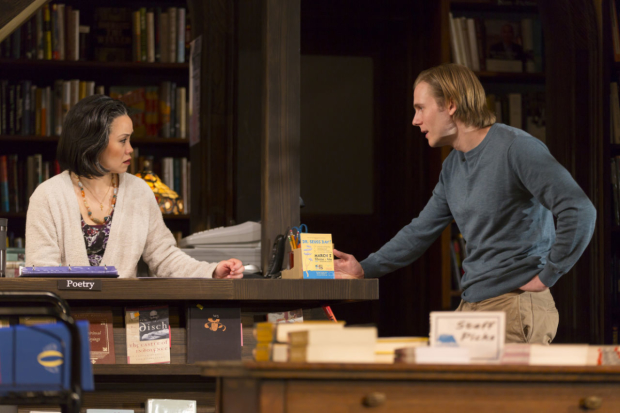After All the Terrible Things I Do

(© T. Charles Erickson)
A. Rey Pamatmat's play After All The Terrible Things I Do, about two people who work together in a bookstore, takes its title from a line in a Frank O'Hara poem that alludes to secrets each character is harboring. After 100 minutes of talk between them (no intermission), with long-suppressed guilt exposed and forgiveness sought and given, the characters arrive at an almost happy ending.
The play begins when Daniel (Zachary Booth) comes to Linda's bookstore to apply for a job. He has returned to this "average-sized, unremarkable" Midwestern city (which is never identified) after living for a time in Chicago with his father. His parents are divorced, and he plans to live with his mother. He tells Linda (Tina Chilip) that he is home to work on a novel and sort out his life. He remembers being a child there and loving the bookstore as a retreat. As he is leaving, Linda launches into suggestions to improve his interview technique, an odd and intrusive thrust from a seemingly impersonal first meeting. Daniel has revealed that he is gay; Linda tells him that others might not appreciate the knowledge, herself excluded, of course.
A month later, Daniel is working in the store. He has told Linda about his novel, which she considers autobiographical. As time passes, various deeds from their pasts are laid out. The strands connecting Linda and Daniel become more apparent, along with shared feelings of guilt and a need for release from memories of abusing the person they loved the most. Although gay bullying is the main subject of the play, their submerged anguish over cruelites they have committed is the true theme.
Playwright Pamatmat and director Peter DuBois, the artistic director of the Huntington Theatre Company, which is presenting the work, have not quite solved the problem of keeping an audience engaged with only two actors onstage. The dramatic action is laid out in a series of reveals rather than physical encounters or true transformations. DuBois makes good use of the elegant bookstore setting, designed by Clint Ramos (also credited with the costumes) to keep the characters moving between the mahogany wooden shelves filled with volumes, a staircase, a window seat, and, smartly, the roof of the store, where Daniel can speak his thoughts alone. Unfortunately, there are times where the theater space itself feels too large for this intimate two-person production.
However, the playwright and the director are helped mightily by carefully wrought performances from Booth and Chilip, who disclose the ties that bind them in structured emotional outbursts, alternating with ordinary conversation. Booth is careful to build an outwardly calm appearance, only gradually letting his torment surface. Chilip playing the Filipino-American, Linda, is old enough to be Daniel's mother according to the play, but doesn't look it. She, too, layers in a business-as-usual demeanor, to cover her heartbreak.
The fuller context of the line from Frank O'Hara reads "after all the terrible things I do how amazing it is to find forgiveness and love," which describes the dramatic arc of the relationship between Daniel and Linda. Under the sensitive direction of DuBois and the laserlike focus by the actors, this production brings to life both O’Hara’s and Pamatmat’s intentions.










